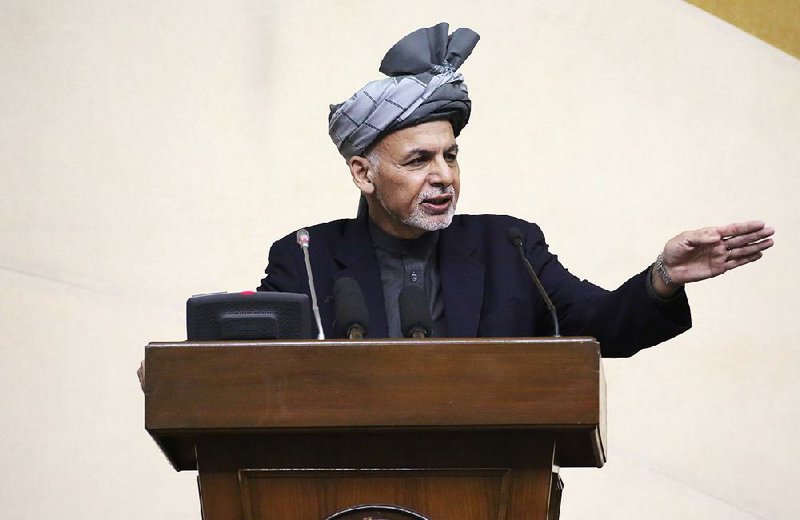Afghan officials hanged six militants Sunday, a resumption of war executions that makes good on President Ashraf Ghani's recent promise to deal harshly with insurgents now that hopes for peace negotiations have evaporated.
The six prisoners were hanged in the morning inside the Pul-i-Charkhi prison -- a detention facility on the outskirts of Kabul that is notorious among Afghans as the site of mass executions by the country's then-communist regime during the 1980s.
According to a list released by the government, those executed were four Taliban militants, one militant from the Haqqani network and an al-Qaida member.
Two of the Taliban members had helped assassinate two senior government officials in recent years, officials said.
One prisoner facilitated a 2011 suicide bomb attack on Burhanuddin Rabbani, who served as temporary president in Afghanistan after U.S. forces toppled the Taliban government 10 years earlier.
The second Taliban member was involved in the 2009 suicide bomb assassination of Abdullah Laghmani, the deputy chief of the country's National Directorate of Security.
The Taliban said in a statement that "thousands of mujahedeen are ready to take revenge from the enemy."
Mohammad Ismail, the Haqqani network member, was convicted for the suicide bombing in a supermarket in January 2011 that killed eight people.
Deputy presidential spokesman Dawa Khan Menapal said the executed men had been charged and tried according to the law. Other government officials said all of the executed prisoners had been found guilty of crimes against "civilian national security."
Details about the al-Qaida prisoner weren't immediately available.
Ghani signed the orders of execution in response to "repeated demands of the families of victims of terrorist attacks," palace officials said in a statement.
"Justice and security are tied together," said political analyst Javed Kohistani, a retired Afghan general.
"The Taliban and other terrorists thought in the past that if they are arrested they can buy their way out by money or other means," he said. "Now with the executions, they will feel fear in their hearts that they will face justice and cannot be spared."
Revenge vowed
The hangings come amid increasing concerns over security in Afghanistan.
Taliban forces, aided by the increasingly influential Haqqani network, have vowed widespread attacks across Afghanistan on the heels of a robust spring poppy harvest -- a main source of income for the insurgent group through the heroin black market.
Government officials, hopeful that the Taliban would enter into peace negotiations, had stopped executing captured prisoners during President Hamid Karzai's administration.
But after a suicide bomb attack in Kabul last month that killed 64 people and wounded about 350, Ghani now says he is no longer interested in negotiating with Taliban leaders.
Taliban leaders have recently warned that their organization will respond to executions by killing government prisoners in their captivity. On Sunday, Taliban spokesman Zabihullah Mujahid said the group has yet to decide how to respond to the recent hangings.
"Our leadership council will come up with reaction on this later," he said.
The Taliban said earlier this year that they would not participate in face-to-face dialogue with the Kabul government, effectively scuttling hopes for reviving the peace process begun last year. Afghan and U.S. officials have said they expect a fierce fight throughout the summer, as the Taliban appear to be on the offensive.
The hangings came a day after two Romanian soldiers were killed during an apparent insider attack in southern Afghanistan while training Afghan security forces.
Army Brig. Gen. Charles Cleveland, spokesman the U.S.-led mission in Afghanistan, said the Romanians were assisting with hands-on training "when some of those they were training apparently fired on them."
NATO officials said they're still investigating whether the Taliban are behind the deaths of the Romanian soldiers in Kandahar province. Other NATO soldiers killed the two attackers, Cleveland said.
"As for what comes next, the details are still to be determined but at a minimum, we will continue our efforts to partner with the Afghans to provide training, advice and assist efforts," Cleveland said.
A Kandahar police official said the shooting occurred after an argument started between the Romanians and the Afghan trainees. One police officer who has been with the department for several years drew his gun and began firing.
"The cause of the incident is fully not clear," said Zia Durrani, the police official.
Information for this article was contributed by Antonio Olivo and Sayed Salahuddin of The Washington Post; by Lynne O'Donnell, Rahim Faiez and Soman Azaty of The Associated Press; and by Mohammad Jawad And Hakim Mukhtar of Deutsche Presse-Agentur.
A Section on 05/09/2016
